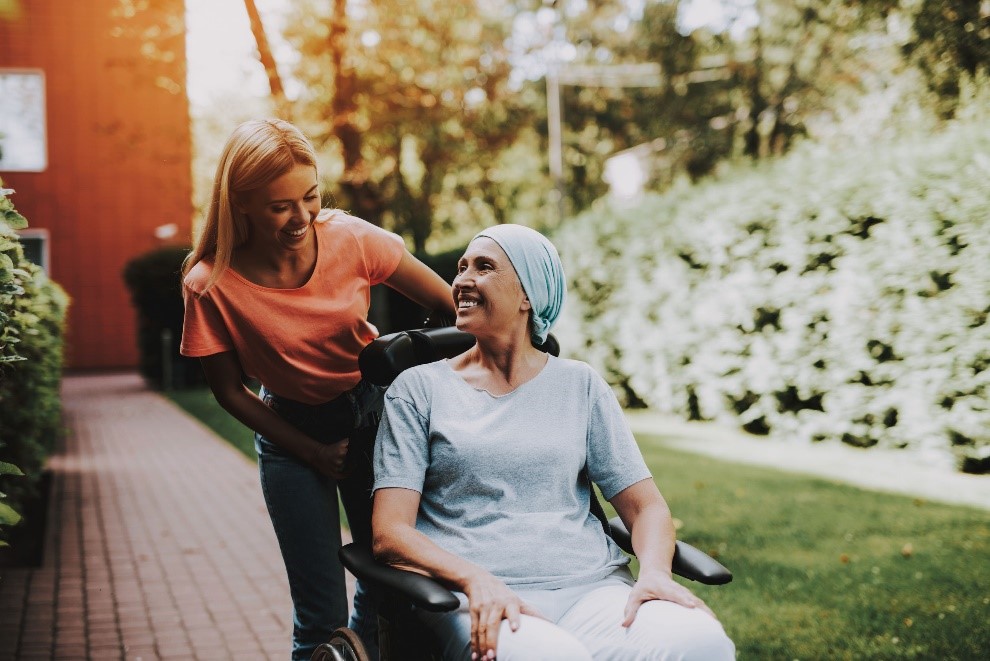
Reducing the Risk of Cancer
Cancer is one of the leading causes of death across the world. According to the National Cancer Institute, it affects more than 18 million people each year and will likely rise to 29.5 million people by 2040. February is National Cancer Prevention Month, making it the perfect time to learn about the most common cancers in seniors and how to reduce your risk of developing cancer.
Common Cancer in Seniors
Many cancers can develop at any age, but some cancers are more prevalent in older adults.
- Prostate cancer: Prostate cancer occurs in the prostate, a small gland in males responsible for transporting sperm and producing seminal fluid. It's one of the most common types of cancer, most commonly found in males aged 50 and older. It's unknown what causes prostate cancer, but the main risk factors aside from age are a family history of prostate cancer and obesity. If caught early, doctors can treat prostate cancer. However, if cancer spreads, it can cause complications in organs such as your bladder and may cause bone pain.
- Bladder cancer: When bladder cells mutate, it creates abnormal cells that cause bladder cancer. There are three different types of bladder cancer depending on what cells in your bladder become cancerous. Symptoms of bladder cancer include blood in the urine, frequent or painful urination and back pain. Bladder cancer is most common in males aged 55 and older. Other risk factors include smoking, a family history of cancer and chronic bladder inflammation.
- Pancreatic cancer: Your pancreas is an organ in the abdomen behind the lower part of the stomach. Pancreatic cancer develops in your pancreases' tissue and often doesn't produce symptoms until later cancer stages, making it difficult to detect. Signs of pancreatic cancer include abdominal pain, loss of appetite, yellowing of the skin, dark urine, light stool, blood clots and fatigue. Doctors commonly diagnose pancreatic cancer in those 65 and older. Other common risk factors include those with a family history of pancreatic cancer and those who smoke or are obese.
- Lung cancer: Lung cancer starts in the lungs and is the leading cause of cancer death worldwide. The main risk factor associated with lung cancer is smoking, although those who don't smoke may develop lung cancer. Lung cancer symptoms include coughing up blood, consistent coughing, chest pain, shortness of breath, bone pain and headache.
- Melanoma (skin cancer): Melanoma occurs when the cells that give your skin a brown or tan color grow out of control, causing a new and unusual growth on the skin. It can develop anywhere on the skin, but it typically occurs on the chest, back, legs, face or neck. Doctors can diagnose melanoma at all ages, but the risk increases after 50, especially in men. It's also most common in those with a weakened immune system, fair skin, light hair and freckling.
Preventing Cancer
You can't prevent all cancer, but you can take steps to decrease your chances of developing cancer significantly.
- Avoid using tobacco. Smoking and tobacco use is the leading lifestyle-related cause of cancer. According to the Center for Disease Control and Prevention, nearly 40 percent of cancer diagnoses in the United States link to tobacco use, and it's more than just lung cancer. Smoking can cause cancer of the liver, pancreas, colon, stomach, esophagus, mouth, throat, bladder, kidney and acute myeloid leukemia. If you're a longtime smoker, reducing your tobacco intake can be challenging. Talk to your doctor about quitting and be open to treatment options for a more extended and healthy life.
- Maintain a healthy weight. Obesity is a significant risk factor for many cancers and other severe health conditions such as heart disease and diabetes. Obesity can also lead to complications during surgery and may even cause more serve symptoms in cancers such as prostate cancer. Maintaining a healthy weight isn't a quick fix, but you can do it through regular exercise and a healthy diet. Aim to complete at least 30 minutes of moderate exercise each day and include lots of nutritious food in your diet, such as fresh produce and lean meats.
- Protect yourself from the sun. Skin cancer is one of the most common cancers among people of all ages. We often think skin damage only occurs when we spend extended amounts of time in the sun on a summer day. However, the sun damages our skin daily, even on cold, cloudy days. Keep your skin safe by wearing sunscreen daily on areas of your body exposed to the sun, such as your face, neck and hands. Also, take extra precautions when you plan on spending a lot of time outside. Reapply sunscreen every 2 to 3 hours and cover what skin you can without overheating.
- Visit your doctor regularly. The earlier your doctor detects cancer, the better chances you have of living a quality life. Regularly visiting your doctor allows doctors to monitor your health and notice when something may be of concern. It's also important to show honesty with your doctor and let them know of any complications or symptoms you may be experiencing. Even if you don't think what you're going through is serious, having an accurate log of symptoms and discomfort can help your doctor identify something before it develops into something more severe.
How Visiting Angels Can Help
If you or a loved one is living with cancer or needs help maintaining a healthier lifestyle, the team at Visiting Angels Wayzata can help. Our team of compassionate caregivers takes pride in helping seniors stay independent by helping with meal preparation, transportation, laundry, personal grooming, medication reminder and more. Our Wayzata office serves those in Minneapolis and the surrounding west and southwest communities. If you'd like to learn more about our services, give us a call at 952.935.0789.
